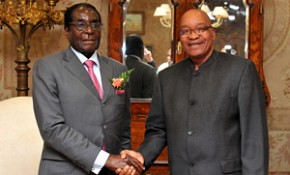
Zimbabwe President Robert Mugabe with South African President Jacob Zuma met to hold discussions on the political and economic issues of Southern Africa. There will be a SADC summit soon., a photo by Pan-African News Wire File Photos on Flickr.
Zim to review trade pact with SA
November 7, 2013
Business Reporter
ZIMBABWE will review its trade agreements with regional countries, particularly South Africa, amid concerns in Government and industry that some third party products from that country are entering Zimbabwe under the guise of Sadc rules of origin. Industry and Commerce Deputy Minister Chiratidzo Mabuwa told Members of Parliament in Victoria Falls that the country will review trade rules with regional partners with emphasis on South Africa due to abuse of the Sadc rules of origin trade pact.
Mrs Mabuwa said some South African companies were receiving cheap products from Asia and were then putting South African trademarks before exporting to Zimbabwe.
The South African companies are reportedly doing so taking advantage of the Sadc rules of origin, which exempt products wholly made in the region from paying duty.
Preferential origin is conferred on goods from particular countries, which have fulfilled certain criteria. To obtain preferential origin goods should be wholly obtained or have undergone sufficient transformation in the manufacturing processes.
Preferential origin under Sadc confers certain tariff benefits (entry at a reduced or zero rate) on goods traded between the regional body’s member countries.
To have preferential origin goods must fulfil relevant conditions laid down in the Sadc protocol on rules of origin to avoid abuse such as including third party products.
In effect, it means that goods must either be manufactured from raw materials or components which have been grown or produced in the exporting Sadc country or, should that not be the case, at least undergo a certain amount of working or processing in the Sadc exporting country. Such goods are then considered to be from Sadc.
“The ministry is engaging and will continue engaging trading partners to come up with favourable trading arrangements, those that create a win-win situation,” she said.
Deputy Minister Mabuwa said the Government will soon engage South Africa with a view to reinstate a 1964 bilateral trade agreement between the two countries.
Ironically, South Africa resorted to the single transformation rule under the Sadc Trade Protocol and unilaterally suspended the 1964 bilateral trade agreement with Zimbabwe fearing its neighbour could be used as conduit for third party products.
While South Africa remains Zimbabwe’s biggest trading partner, although Zambia has overtaken it as the latter’s biggest export market, Zimbabwe’s industry faces serious threats of collapse due to low-priced imports mostly from South Africa.
With industry facing a myriad of constraints among them stiff external competition, high cost of finance, old and inefficient equipment, high cost of utilities and labour, shortage of power and raw material, efforts to revive industry are in jeopardy.
Arguably, South Africa will always be a major trading partner of Zimbabwe, but fraudulent trading practices have cast aspersions on the integrity of the two countries’ trade pacts and has compounded the already dire situation of local industry.
Manufacturing remains one of the major pillars for economic growth in Zimbabwe, but a cocktail of problems has seen industrial capacity utilisation declining.
According to the latest Confederation of Zimbabwe Industries manufacturing sector survey, industrial capacity has fallen from 44,9 percent in 2012 to 39,5 percent in 2013 despite significant recovery from an average 10 percent in 2009 following a decade of economic recession.
In terms of competition from imports, CZI said 85 percent of respondents indicated that they compete with South African products while 67 percent of the competing products are from China.
No comments:
Post a Comment